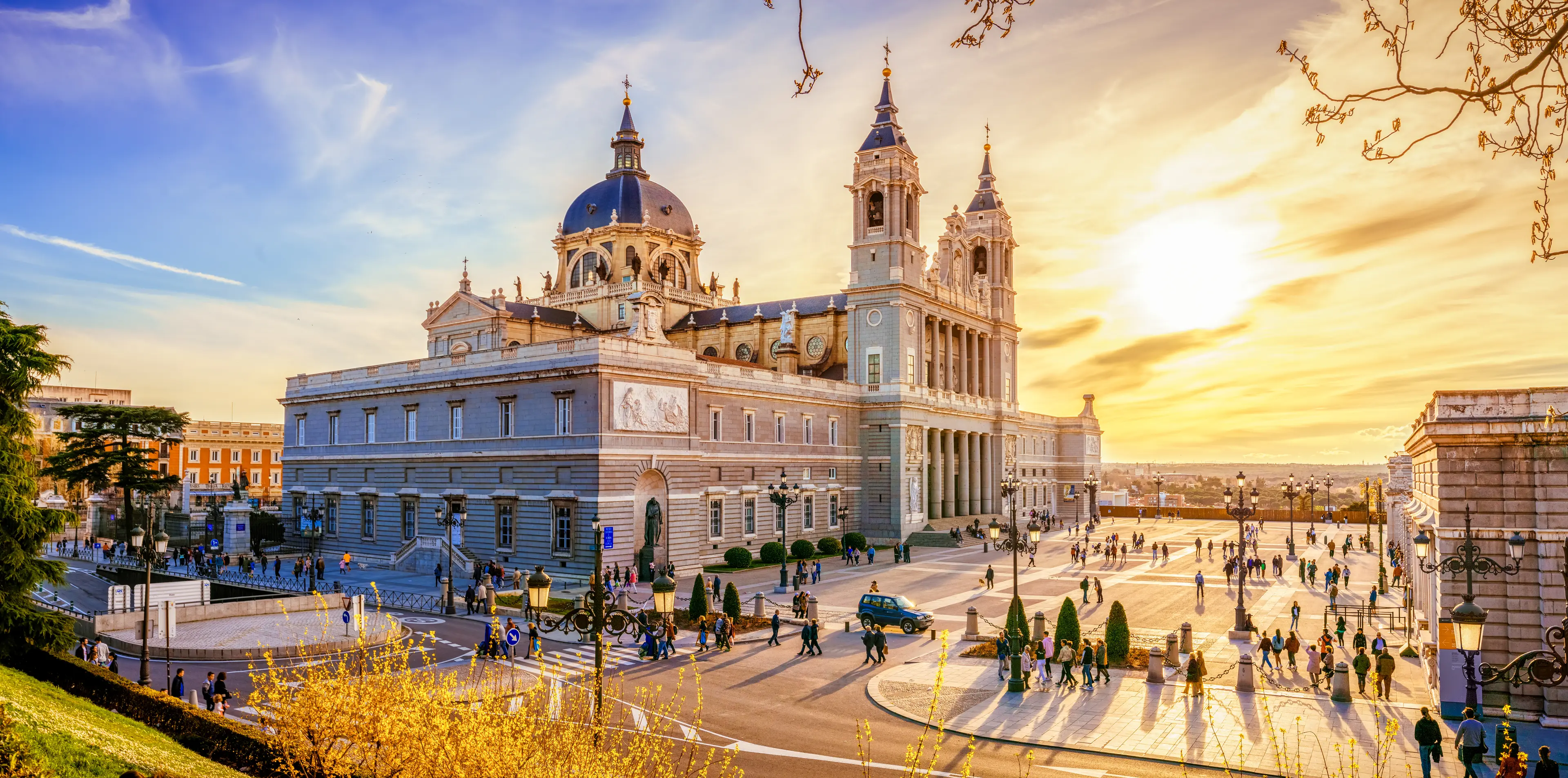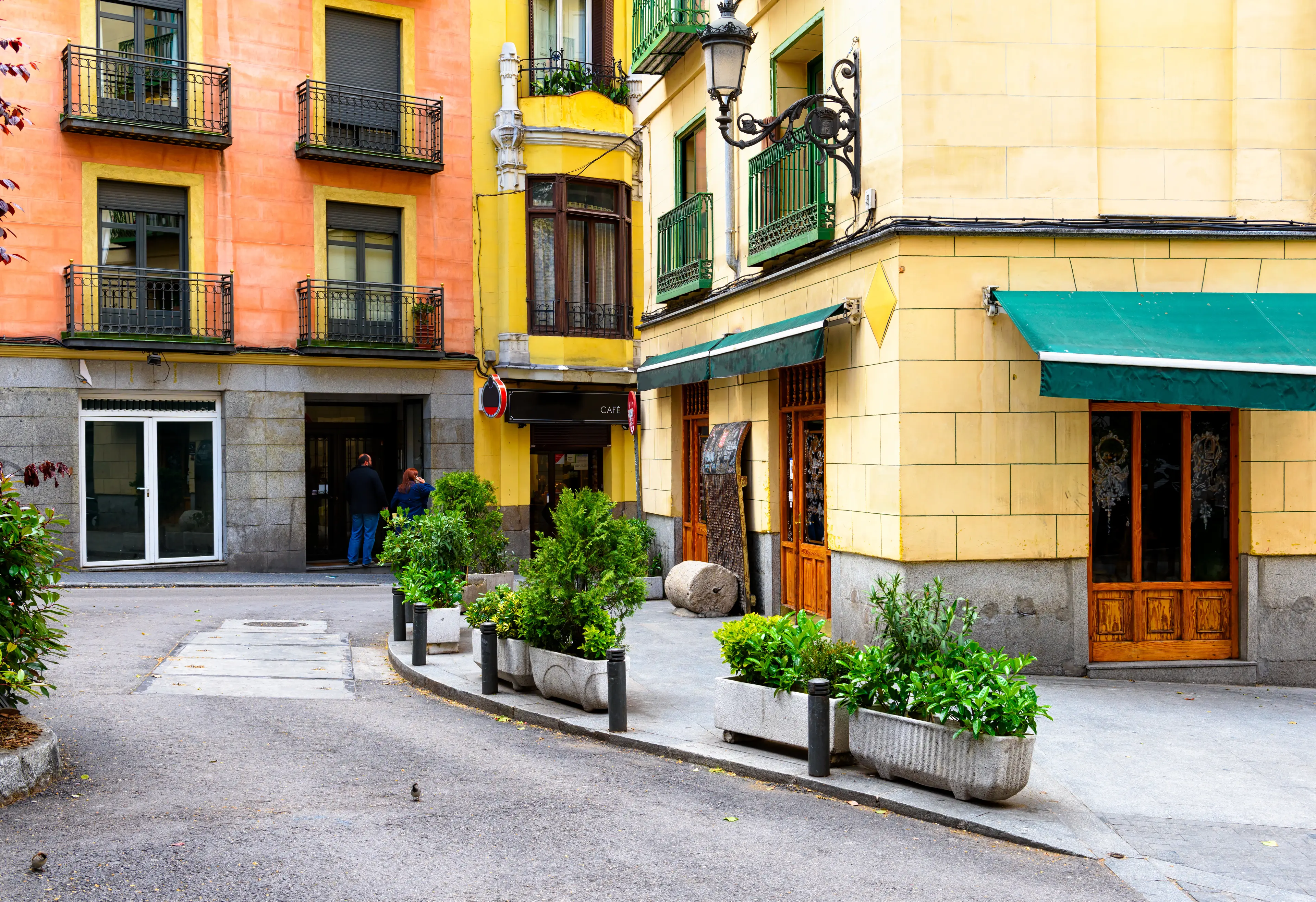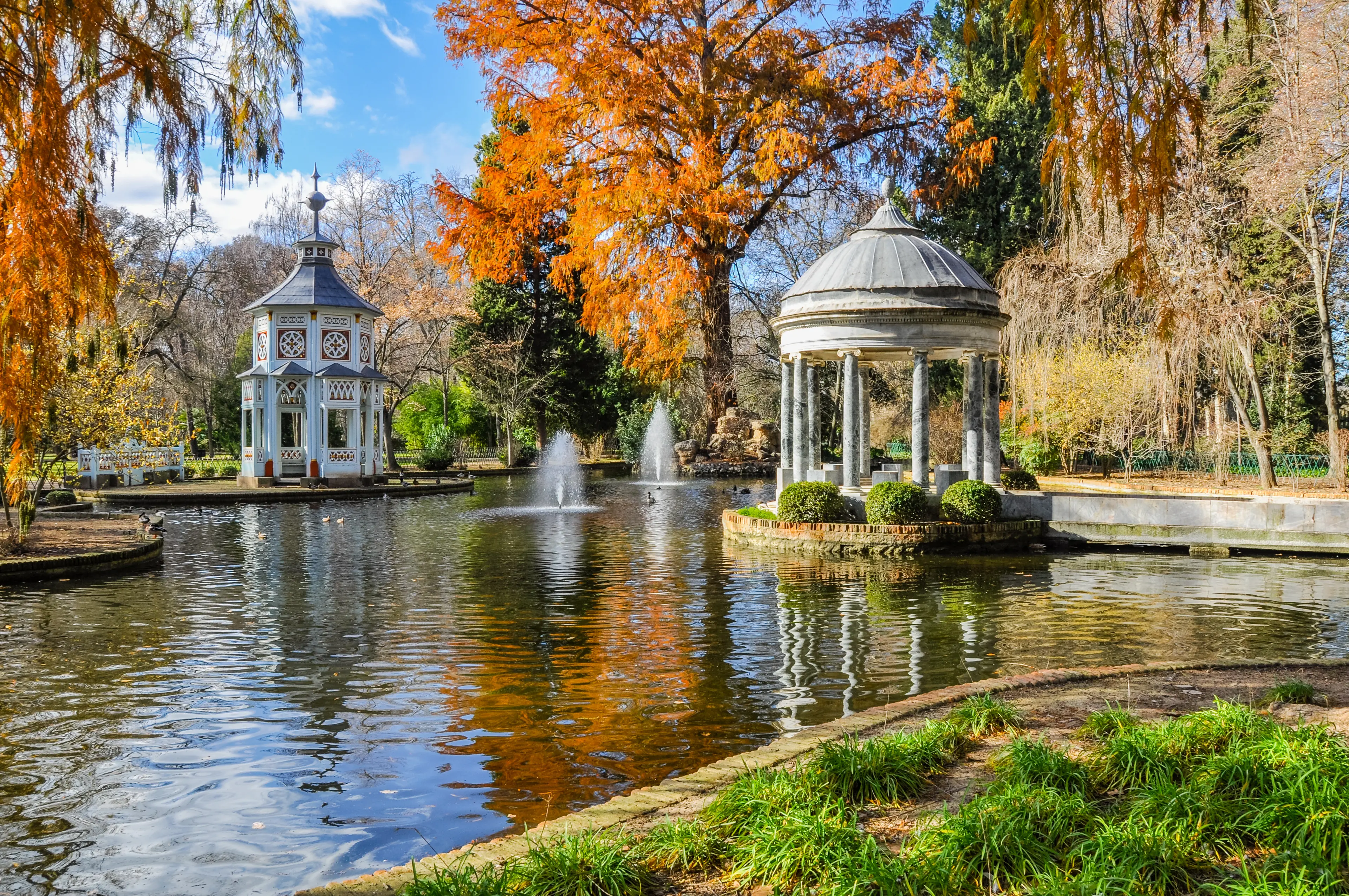2-Day Madrid Hidden Gems: Food, Wine & Shopping for Couples
Madrid, Spain
2 days
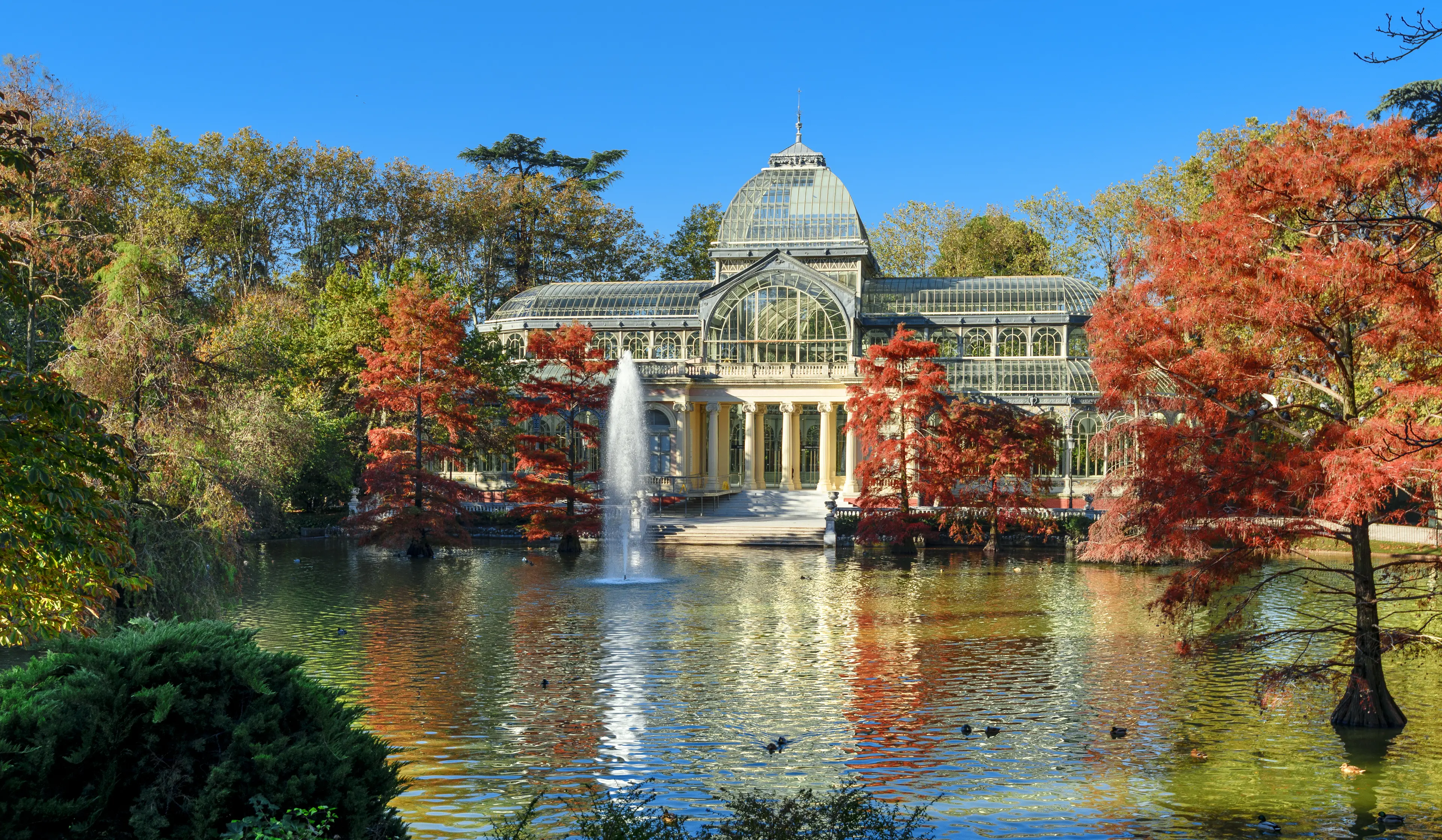

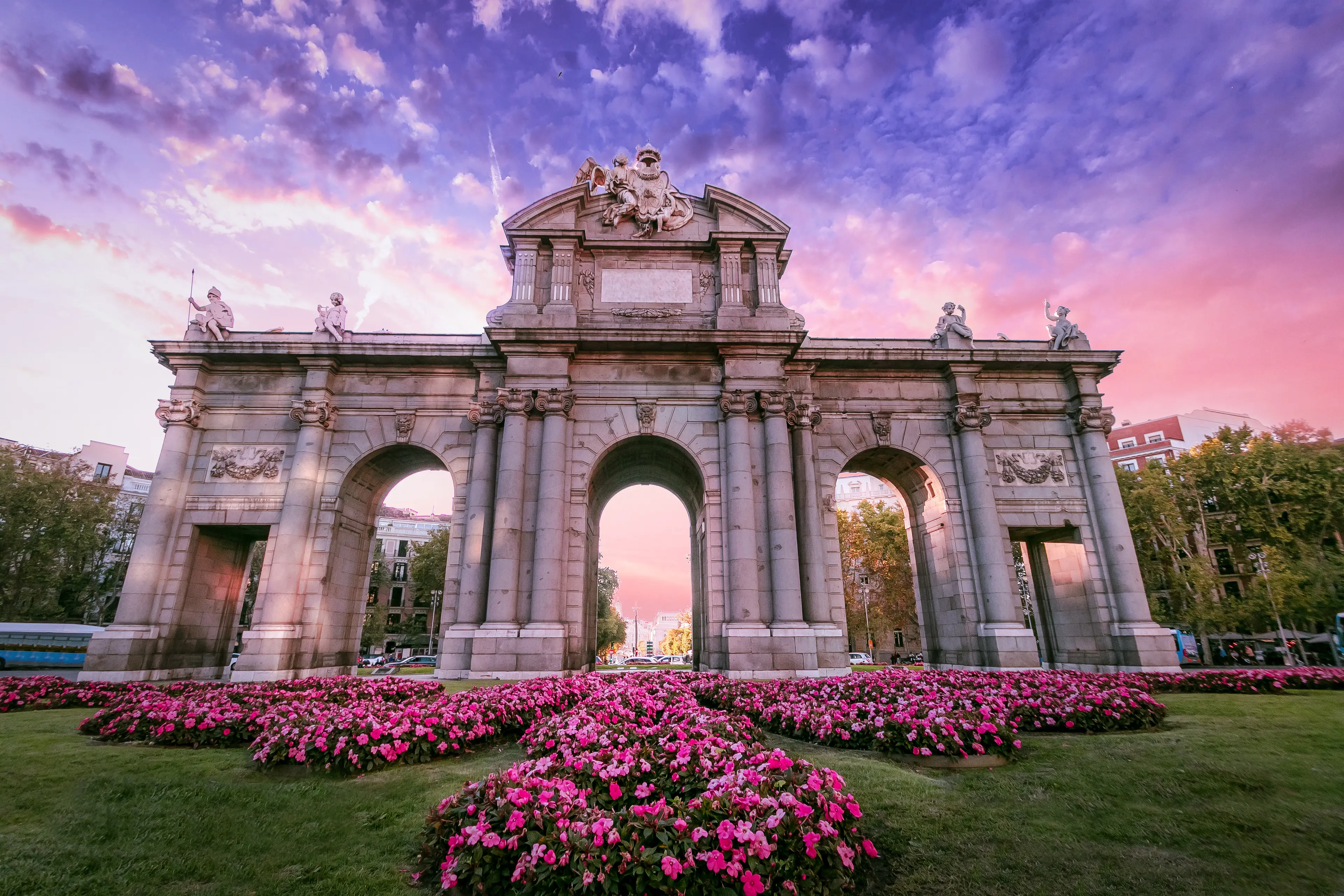
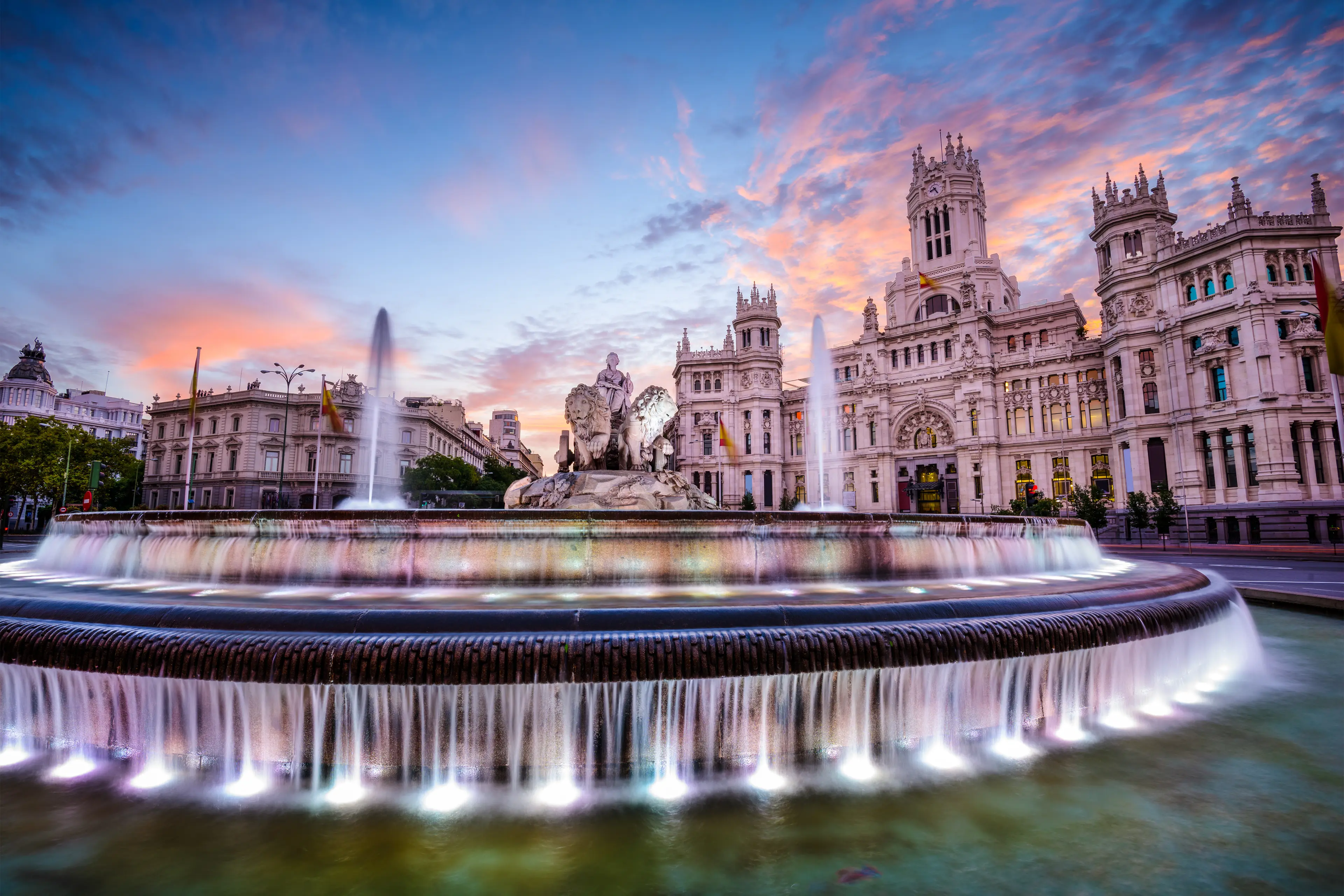
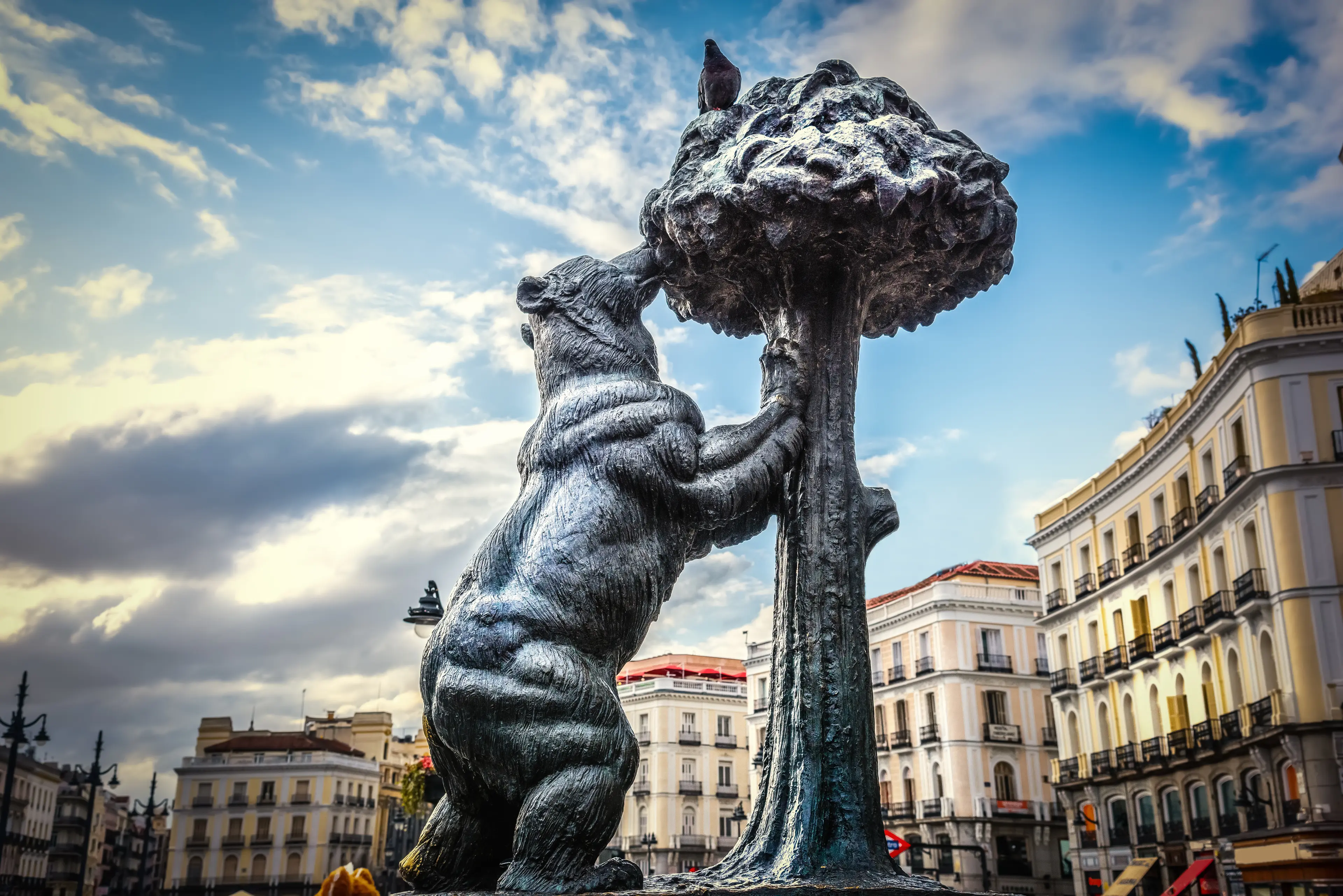
About Madrid, Spain
Experience the vibrant culture of Madrid, Spain's capital city. Immerse yourself in its rich history by visiting the Royal Palace, Prado Museum, and Retiro Park. Enjoy Madrid's renowned culinary scene, from traditional tapas bars to Michelin-starred restaurants. Explore the lively nightlife in various districts like Malasaña and Chueca. Madrid offers a blend of modernity and tradition, with bustling shopping streets, flamenco shows, and world-class football at Santiago Bernabeu Stadium. Don't miss the city's numerous festivals, including the San Isidro Bullfighting Festival. With its sunny climate, Madrid is a year-round destination offering a warm welcome to every traveler.
2-Day Itinerary
Day 2
Art, Architecture, and Traditional Spanish Culture
Morning
Start your second day with a visit to a local art museum. Madrid is home to several world-class museums, offering a wide range of art from different periods and styles.
Lunch
Enjoy a picnic lunch in one of Madrid's beautiful parks. Pick up some fresh bread, cheese, and fruit from a local market, and find a quiet spot to relax and enjoy the scenery.
Afternoon
Spend the afternoon exploring one of Madrid's historic neighborhoods. This is a great opportunity to see some of the city's beautiful architecture and get a feel for local life.
Dinner
For your final dinner in Madrid, head to a traditional Spanish restaurant. Here, you can enjoy a range of dishes, from paella to roast suckling pig, all paired with a bottle of local wine.
Evening
End your trip with a visit to a local flamenco show. Flamenco is a traditional Spanish dance, and watching a performance is a great way to immerse yourself in the local culture.
Local Food and Drinks (12)

Paella
A traditional Spanish dish originating from Valencia, but popular throughout Spain including Madrid. It's a rice dish often cooked with a variety of seafood, meat, and vegetables.

Churros con Chocolate
A popular sweet treat in Madrid, churros are fried dough pastries served with a cup of thick, rich hot chocolate for dipping.

Tapas
A variety of small, savory Spanish dishes, served as a snack with drinks, or with other tapas as a meal. To experience real Spanish culture in Madrid, you must try tapas.

Jamón Ibérico
A type of cured ham produced in Spain, known for its rich, savory flavor and melt-in-your-mouth texture. It's a staple in Madrid's food scene.

Tortilla Española
Also known as Spanish omelette, it's a traditional dish from Spain and a staple food in Madrid. It's made with eggs, potatoes, and onions.

Gazpacho
A cold soup made of raw, blended vegetables. A classic of Andalusian cuisine, it's widely eaten in Madrid, especially during the hot summer months.

Cocido Madrileño
A traditional chickpea-based stew from Madrid. A hearty and comforting dish, typically served during the colder months.

Callos a la Madrileña
A traditional Madrid dish made from beef tripe, chorizo, and morcilla (blood sausage). It's a hearty and flavorful stew.

Sangria
A popular drink in Madrid, made with red wine and chopped fruit, often with other ingredients such as orange juice or brandy.

Tinto de Verano
A refreshing, wine-based drink similar to sangria. It's popular in Madrid, especially during the summer months.

Cava
A Spanish sparkling wine from Catalonia, but widely available and enjoyed in Madrid. It's often served at celebrations.

Horchata
A traditional Spanish beverage made from tigernuts, water, and sugar. It's a refreshing, sweet drink popular in Madrid, especially during the summer.
Best time to visit
The best time to visit Madrid, Spain as a tourist is during the spring (March to May) and fall (September to November). During these periods, the weather is mild and pleasant, perfect for sightseeing and outdoor activities. Additionally, these seasons are less crowded compared to the summer months, allowing you to explore the city more comfortably. However, if you're interested in experiencing Madrid's vibrant festivals, consider visiting in May for the San Isidro Festival or in August for the La Paloma Festival.
How to get around
Madrid Metro
The Madrid Metro is a rapid transit system serving the city of Madrid. It is one of the most extensive and fastest-growing metro networks in the world. It operates from 6:00 AM to 1:30 AM.
Bus
Madrid's bus network is extensive and buses are a common way to travel around the city. The network is operated by EMT Madrid, which runs frequent services throughout the city and its suburbs.
Taxi
Taxis are plentiful in Madrid and can be hailed on the street or booked in advance. They are metered and offer a convenient way to get around, especially if you're traveling with luggage or in a group.
Ridesharing
Ridesharing services like Uber and Cabify operate in Madrid. These can be a convenient option, especially if you're familiar with these services from home. They can be booked via their respective apps.
Bike
Madrid has a bike sharing system called BiciMAD with stations throughout the city. It's a great way to get around, especially in the city center where distances between attractions are short.
Car Rental
Renting a car can be a good option if you plan to explore outside of Madrid, but it's not recommended for city travel due to traffic and parking difficulties.
Train
Madrid's train network, Cercanías, connects the city center with suburbs and nearby towns. It's a good option if you're staying outside the city or plan to visit places like Toledo or Segovia.
Walk
Madrid's city center is compact and most of the major sights are within walking distance of each other. Walking is a great way to explore the city at your own pace and discover its many hidden gems.
Tram
Madrid has a single tram line, known as Metro Ligero, which serves the northwestern suburbs. It's not as useful for tourists unless you're staying in that area, but it's a modern and comfortable way to travel.
Important information
Currency€ EUR
Time zoneUTC+1
Driving sideRight
Emergency phone112
Drinking waterYes
Power sockets
Voltage230 V
Things to know about Madrid, Spain as a first time visitor
1
Madrid is the capital and largest city in Spain.
2
The official language is Spanish, but English is widely spoken in tourist areas.
3
The currency used in Madrid is the Euro (€).
4
Credit cards are widely accepted, but it's always good to have some cash on hand for smaller establishments.
5
Madrid operates on Central European Time (CET) and observes daylight saving time.
6
The city has a Mediterranean climate, with hot summers (average temperatures of 85°F/29°C) and mild winters (average temperatures of 41°F/5°C).
7
Tipping is not mandatory in Madrid, but it is customary to leave small change at bars and cafes, and 10% at restaurants if you are satisfied with the service.
8
Madrid is generally safe for tourists, but like any large city, it's important to be aware of your surroundings and keep an eye on your belongings.
9
Public transportation in Madrid is excellent, with a comprehensive metro and bus system. Taxis and ride-sharing services are also readily available.
10
Madrid is known for its late-night culture. Many restaurants don't open for dinner until 9pm, and the city's nightlife can go on until the early morning hours.
11
The city is famous for its culinary scene. Be sure to try local specialties like tapas, paella, and churros con chocolate.
12
Madrid has a smoking ban in all enclosed public places, but smoking is still common in outdoor areas.
13
The city has a dress code that leans towards the conservative side, especially in religious sites. It's best to avoid wearing shorts or sleeveless tops in these places.
14
Pharmacies in Madrid are marked by a green cross. They are well-stocked and pharmacists often speak English.
15
The city's tap water is safe to drink and of high quality.
16
Madrid is a walkable city with many pedestrian zones, but it's also quite hilly, so comfortable shoes are a must.
17
The city is in the same time zone as Central European Time (CET), which is 6 hours ahead of Eastern Standard Time (EST).
18
If you're planning to visit several museums, consider purchasing a Madrid Card for unlimited access to over 50 attractions.
19
Madrid has a siesta culture, meaning many shops and businesses close for a few hours in the afternoon.
20
The city is very bike-friendly, with many bike rental shops and dedicated bike lanes throughout the city.
Basic Spanish to know as a first time visitor
English phrase | Native phrase | Pronunciation | When to use it |
|---|---|---|---|
Hello | Hola | oh-la | Greeting someone |
Goodbye | Adiós | ah-dee-os | Saying goodbye |
Please | Por favor | por fa-vor | Making a request |
Thank you | Gracias | gra-see-as | Expressing gratitude |
Yes | Sí | see | Agreeing or confirming |
No | No | no | Disagreeing or denying |
Excuse me | Perdón | per-don | Getting attention or apologizing |
I'm sorry | Lo siento | lo see-en-to | Apologizing |
Do you speak English? | ¿Hablas inglés? | ab-las in-gles | Asking if someone speaks English |
I don't understand | No entiendo | no en-tee-en-do | When you don't understand what was said |
Where is...? | ¿Dónde está...? | don-de es-ta | Asking for directions |
Bathroom | Baño | ban-yo | Looking for a restroom |
Help | Ayuda | a-yu-da | When you need assistance |
Food | Comida | co-mee-da | Talking about food |
Water | Agua | a-gwa | Asking for water |
Beer | Cerveza | ser-ve-za | Ordering a beer |
Wine | Vino | vee-no | Ordering wine |
How much does it cost? | ¿Cuánto cuesta? | quan-to cues-ta | Asking the price of something |
I would like... | Me gustaría... | me gus-ta-ree-a | Expressing a desire or making a request |
Good night | Buenas noches | bwe-nas no-ches | Saying goodnight |
Packing List
Clothing
Lightweight clothing
Comfortable walking shoes
Underwear
Socks
Sleepwear
Swimsuit (if planning to swim)
Light jacket or sweater (for cooler evenings)
Sunglasses
Hat or cap for sun protection
Toiletries
Travel-size shampoo
Travel-size conditioner
Travel-size body wash
Toothbrush
Toothpaste
Deodorant
Razor
Shaving cream
Sunscreen
Lip balm
Personal hygiene items
Prescription medications
First-aid kit
Travel documents and essentials
Passport
Driver's license or ID card
Credit and debit cards
Cash and coins
Travel insurance documents
Hotel and/or car rental reservations
Emergency contacts and important addresses
Maps and guidebooks
Electronics and gadgets
Smartphone
Charger for smartphone
Headphones
Camera
Charger for camera
Universal power adapter
Portable power bank
Miscellaneous items
Snacks
Bottled water
Travel pillow
Earplugs
Eye mask
Travel-size laundry detergent
Travel-size umbrella
Reusable shopping bag
Books or e-books for leisure reading
Spanish phrasebook or language app
Weather Conditions
When visiting Madrid, Spain, it's important to be prepared for a variety of weather conditions. The city experiences a hot-summer Mediterranean climate, which means hot summers and mild winters. During the summer months, from June to August, Madrid can get quite hot with temperatures often reaching up to 86°F (30°C). It's advisable to pack light clothing, sunscreen, and a hat to protect yourself from the sun. Don't forget to stay hydrated, especially when sightseeing in the heat of the day. In contrast, winter months from December to February can be quite chilly with temperatures dropping to around 41°F (5°C). If you're planning a trip during this time, be sure to pack warm clothing, including a coat, scarf, and gloves. Despite the cold, Madrid's winter is usually quite dry, with infrequent rain or snow. Spring and autumn are generally mild and pleasant, with temperatures ranging from 50°F to 70°F (10°C to 21°C). These seasons are a great time to visit Madrid as the weather is comfortable for exploring the city and its surroundings. Regardless of when you visit, remember that Madrid is a city with a high altitude, which can lead to intense sun and rapid weather changes. Always carry a light jacket or sweater with you, even in the summer, as evenings can get cool. Lastly, Madrid is known for its clear, blue skies. Even in winter, the city enjoys many sunny days, so don't forget your sunglasses at any time of the year. Enjoy your trip to this vibrant Spanish city!
| Month | Hi / Lo (°C) | Weather Overview |
|---|---|---|
January | 10° / 2° | January is the coldest month in Madrid, with occasional snowfall. Dress warmly and enjoy the beautiful, crisp winter days. |
February | 13° / 3° | February sees a slight increase in temperatures, but it's still quite cold. It's a great time to visit museums and indoor attractions. |
March | 17° / 5° | March marks the beginning of spring in Madrid. The weather is mild, perfect for outdoor activities and sightseeing. |
April | 19° / 7° | April is a pleasant month with moderate temperatures. It's a great time to enjoy Madrid's parks and gardens. |
May | 22° / 11° | May is warm and sunny, with long daylight hours. It's an ideal time to explore the city and its surroundings. |
June | 27° / 15° | June is the start of summer in Madrid. Expect hot days, perfect for enjoying a cold drink at a terrace cafe. |
July | 30° / 18° | July is the hottest month in Madrid. Stay hydrated and take advantage of the city's many pools and air-conditioned spaces. |
August | 30° / 18° | August is equally hot, with many locals leaving the city for vacation. It's a good time to visit tourist attractions as they are less crowded. |
September | 25° / 15° | September sees a drop in temperatures, marking the start of autumn. It's a great time to visit, with fewer tourists and pleasant weather. |
October | 20° / 11° | October offers mild autumn weather, perfect for exploring the city. The changing leaves add a beautiful touch to the cityscape. |
November | 14° / 6° | November is a cooler month, with shorter days. It's a good time to visit indoor attractions like museums and galleries. |
December | 11° / 3° | December is a festive month in Madrid, with Christmas markets and lights. It's cold, so pack warm clothes and enjoy the holiday spirit. |
Did you know?
Places near by Madrid, Spain

Toledo
Historic city known for its medieval Arab, Jewish and Christian monuments in its walled old city.

Segovia
Famous for its magnificent Roman aqueduct and fairy-tale castle.

El Escorial
Historical residence of the King of Spain, featuring a vast library and stunning gardens.

Avila
Known for its intact medieval city walls, with 80-plus semicircular towers and 9 gates.

Salamanca
Renowned for its 13th-century University of Salamanca and the ornate Casa de las Conchas.

Cuenca
Famous for its hanging houses (Casas Colgadas), perched on the edge of a cliff.

Guadalajara
Known for its Mudejar-style buildings and the Palacio del Infantado.

Alcala de Henares
Birthplace of Miguel de Cervantes, author of Don Quixote, with a museum in his honor.

Valencia
City with futuristic structures including a planetarium, an oceanarium and an interactive museum.

Zaragoza
Known for its Basilica of Our Lady of the Pillar, Roman ruins, and Renaissance palaces.
